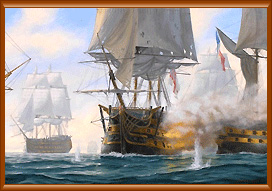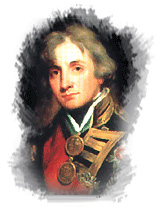The Battle of Trafalgar
It was a part of the Napoleonic wars. Napoleon longed to expand his empire to the east and conquer Britain. His ambition was torn by this battle and Admiral Nelson, the man whose name is immortal. This battle had ended with Britain's victory and Britain remained unchallenged at Sea for years.
Historical Background
Napoleon's ambition
 The Battle of Trafalgar
The Battle of Trafalgar
His dream was to become a naval officer, but he had to be an artillery officer because only noble family could join the Naval Academy. When he was 20, the French Revolution took place and he defeated English in 1793 and Austrians in 1795. In 1797, Napoleon could attain Vienna, the capital of Austria. The treaty of campo formio was signed on October 17, 1797 and Austrian lands ceded. The first phrase of Napoleonic war ended like this and he returned his attention to the Britain.
In late 1797 Napoleon encouraged and persuaded French to believe that English monarchy should be destroyed by them and then the Europe would be at their feet. He also started to concentrate his effort on the navy. But his invade plans were blockaded by Admiral Nelson and Royal Navy.
In 1802, the treaty of Amiens was signed and two countries were in peace for 14 months. Napoleon whose power was rapidly on the rise conferred upon him the tile of Emperor Napoleon I on 2 December 1804. In this day, Napoleon's ambition to expand his empire rose up. He acquired the power to invade England and ships.
Admiral Nelson's endless chase
 Admiral Nelson
Admiral Nelson
At that time, Napoleon's fleets were dispersed in five havens, Brest, Rochefort, Toulon in France and Cadiz and Ferrol in Spain. British Royal Navy was keeping these fleets under their surveillance. They set their attempt to combine their fleets in Caribbean Sea, because they could reach English Channel only after they tricks British Navy.
Admiral Charles Villeneuve's fleet was in Toulon while Admiral Nelson's fleet secured his movement. On March 30, 1805 he escaped port and headed to Atlantic Ocean. When Nelson realized Toulon's fleet sailed out of the port, he assumed that French ships would sail to Mediterranean Sea. He drove his fleet to Egypt, but he found his mistake and chased Villeneuve. Spanish fleet in Cadiz also slipped out of the port and joined Villeneuve's fleet.
Failure of Napoleon's invasion plan
For five months, Napoleon waited the arrival of his fleet, but he was reported that Admiral Villeneuve couldn't combine fleet. And the Austria and Russia set their attempts to invade France, while the Napoleon had concentrate on invasion of England. He abandoned the invasion plan and led his Grand Armee to the Germany. He ordered Villeneuve to sail to the Mediterranean to support French land forces during their campaign against Austria and Russia.
The battle
Fleet and commanders
| Winner : English fleet | French-Spanish combined fleet | |
|---|---|---|
| Commanders | Commander-in-chief : Vice Admiral Lord Horatio Nelson Vice Admiral : Collingwood |
Commander-in chief : Pierre-Charles Villeneuve(French) Spanish |
| Crew | 18,000 men and wemen | |
| Total : 32 Battleships : 25 Frigates and |
1French ships - Total : 26(Battleships: 18, Others: 8) Spanish ships - Battleships : 15 |
The Battle has joined
On October 21, English fleet discovered Villeneuve's fleet at Trafalgar off coast of Spain. Admiral Nelson immediately made the signal to divide his fleet into two columns, weather and lee. He led weather column while Admiral Collingwood led lee column. When French-Spanish combined fleet was blocked by Royal Navy, they turned around and sailed to the port again.
Villeneuve's fleet was in formation which the ships position a line north-to-south, it was very common battle line, because battleships could discharge guns only when their broadsides are heading to their enemy ships.
English columns followed the direction of Admiral Nelson's plan and cut off the battle line of combined fleet from the west. Nelson knew that the wind changed and it helped British ships to sail fast. Nelson ordered to the first column to broke in front of Villeneuve's ship, the Bucentaure and destroy flagships first.
When Nelson turned the bow of the Victory and discharged guns to Bucentaure, Collingwood broke French line further south. His column's mission was to ambush Spanish commander's ship and other warships which were dispersed by Nelson's attack.
br While 2 ships of Nelson's column changed course and attacked ships which were in van of French fleet, Collingwood's column engaged second line of Spanish fleet. At about 1:15 pm Nelson was hit by a sniper at Redoutable and carried to the cockpit. Weather column devastated the middle battle line of French fleet and sailed to the north where the 2 ships of weather column was under attack of French fleet's vanguard ships. French fleet's vanguard ships fled when they discovered the weather column's sail to them. Nelson died after his captain, Thomas Hardy reported the victory of his fleet at 4:30pm.
Result
Aftermath
Although, French historians deemed this battle was as an unfortunate affair, the truth that it halted the Napoleon's attempts to invade England and became the reason why Napoleon announced Continental System can't be denied.
English celebrated the victory of this battle during English Empire era. This continued till today. The Royal Navy held series of ceremonies, such as the International Fleet Review, Son et Lumiere, International Drumhead ceremony to celebrate the bicentennial anniversary of this battle in 2005.
Reference
Websites
- HMS Victory : http://www.hms-victory.com/
- National Archives : Trafalgar Ancestors : http://www.nationalarchives.gov.uk/trafalgarancestors/
- BBC history : http://www.bbc.co.uk/london/content/articles/2005/04/21/nelson_feature.shtml
- BBC News : http://www.bbc.co.uk/hampshire/content/articles/2005/05/17/trafalgar200_feature.shtml
- Napoleon.Org : http://www.napoleon.org
- Nelson Navy : http://www.nelsonsnavy.co.uk/battle-of-trafalgar.html